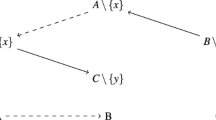Abstract
In many everyday situations, we need to rank individuals or single items having the possibility to observe the behavior of groups. In this paper we propose a way to get this ranking over the elements of a set X, starting from an arbitrary preference relation over the subsets of X and taking into account the information provided by this ranking over the subsets. To this purpose, we use a very common approach in the social choice framework: we single out some properties that a general solution should satisfy, and we prove that these properties characterize a unique solution. Given the generality of the approach, we believe that this paper is only a starting point for a more extended analysis. In particular, it is clear that different contexts can suggest other properties, thus identifying alternative ranking methods.
Similar content being viewed by others
References
Banzhaf J III (1965) Weighted voting doesn’t work: a mathematical analysis. Rutgers Law Rev 19:317
Barberà S, Bossert W, Pattanaik PK (2004) Ranking sets of objects. In: Handbook of utility theory. Springer, Boston, pp 893–977
Carreras F, Freixas J (2008) On ordinal equivalence of power measures given by regular semivalues. Math Soc Sci 55(2):221–234
Demange G (2017) Mutual rankings. Math Soc Sci 90:35–42
Freixas J (2010) On ordinal equivalence of the Shapley and Banzhaf values for cooperative games. Int J Game Theory 39(4):513–527
Haret A, Hossein K, Moretti S, Öztürk M (2018) Ceteris paribus majority for social ranking. In: Proceedings of the 27th international joint conference on artificial intelligence, IJCAI 2018, pp 303–309
Horan S, Sprumont Y (2016) Welfare criteria from choice: an axiomatic analysis. Games Econ Behav 99:56–70
Kannai Y, Peleg B (1984) A note on the extension of an order on a set to the power set. J Econ Theory 32(1):172–175
Lucchetti R, Moretti S, Patrone F (2015) Ranking sets of interacting objects via semivalues. Top 23(2):567–590
May K (1952) A set of independent necessary and sufficient conditions for simple majority decision. Econom J Econom Soc 20(4):680–684
Merlin V (2003) The axiomatic characterizations of majority voting and scoring rules. Math Soc Sci 161:87–109
Moretti S (2015) An axiomatic approach to social ranking under coalitional power relations. Homo Oecon 32(2):183–208
Moretti S, Öztürk M (2017) Some axiomatic and algorithmic perspectives on the social ranking problem. In: International conference on algorithmic decision theory. Springer, pp 166–181
Penrose LS (1946) The elementary statistics of majority voting. J R Stat Soc 109(1):53–57
Shapley L (1953) A value for n-person games. In: Tucker AW (ed) Contributions to the theory of games, vol 2. Princeton University Press, Princeton, pp 307–317
Shapley LS, Shubik M (1954) A method for evaluating the distribution of power in a committee system. Am Political Sci Rev 48(03):787–792
Acknowledgements
We thank two anonymous referees for their valuable comments on a former version of this paper, their suggestions helped us to substantially improve the results.
Author information
Authors and Affiliations
Corresponding author
Rights and permissions
About this article
Cite this article
Bernardi, G., Lucchetti, R. & Moretti, S. Ranking objects from a preference relation over their subsets. Soc Choice Welf 52, 589–606 (2019). https://doi.org/10.1007/s00355-018-1161-1
Received:
Accepted:
Published:
Issue Date:
DOI: https://doi.org/10.1007/s00355-018-1161-1



